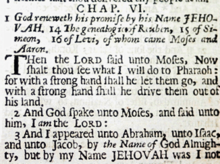|
|
General: ◄ Zacarías 14:5 ►
Escolher outro painel de mensagens |
|
|
| De: Halcon77 (Mensagem original) |
Enviado: 31/08/2015 20:51 |
Jehova es el Dios de Israel, ese Jehova es el de Zacarias 14:5
Mateo 25:31-46 no encaja en esa profecía, eso fué un intento vano de los apóstoles
|
Y huiréis al valle de mis montes, porque el valle de los montes llegará hasta Azal; huiréis tal como huisteis a causa del terremoto en los días de Uzías, rey de Judá. Y vendrá el SEÑOR mi Dios, y todos los santos con El.
-------------------------------------------
|
Hebrew Texts
Westminster Leningrad Codex
וְנַסְתֶּ֣ם גֵּֽיא־הָרַ֗י כִּֽי־יַגִּ֣יעַ גֵּי־הָרִים֮ אֶל־אָצַל֒ וְנַסְתֶּ֗ם כַּאֲשֶׁ֤ר נַסְתֶּם֙ מִפְּנֵ֣י הָרַ֔עַשׁ בִּימֵ֖י עֻזִּיָּ֣ה מֶֽלֶךְ־יְהוּדָ֑ה וּבָא֙ יְהוָ֣ה אֱלֹהַ֔י כָּל־קְדֹשִׁ֖ים
| | |
|
|
|
|
El que va a venir es Dios, Strong's 3068
|
|
|
|
|
Vamos a ver, idiota con cerebro de guisante: Por supuesto que es Dios quien vendrá del cielo con todos sus santos, y descenderá sobre el monte de los Olivos poniendo sus pies, pero ese Dios NO ES EL DIOS SUPREMO, EL PADRE, SINO EL SEGUNDO DIOS, JESUCRISTO, EL IEVE MENOR.
Tu dices que el pasaje de Mateo 25:31-46 se lo inventaron los apóstoles, pues venga, ¡demuéstralo!.
Tú rechazas esas palabras de Jesús porque si creyeras en ellas tendrías que reconocer que Jesús es el segundo IEVE, el cual vendrá del cielo con todos sus santos para reinar sobre la tierra, y pondrá Sus pies sobre monte de los Olivos, exactamente el mismo monte desde el cual Jesús se fue al cielo. En fin, tu sigue así, que al final de tu podrida vida lo que te espera es el lago de fuego.
|
|
|
|
|
Strong's 3068 no es Jesus, es el dios supremo.
Titomierda, ya abandona las 21tesis. |
|
|
|
|
|
|
| De: Halcon77 (Mensaje original) |
Enviado: 31/08/2015 14:06 |
Jehovah
From Wikipedia, the free encyclopedia
Jehovah ( jə-HOH-və) is a Latinization of the Hebrew יְהֹוָה, one vocalization of the Tetragrammaton יהוה (YHWH), the proper name of the God of Israel in the Hebrew Bible.
The consensus among scholars is that the historical vocalization of the Tetragrammaton at the time of the redaction of the Torah (6th century BCE) is most likely Yahweh. The historical vocalization was lost because in Second Temple Judaism, during the 3rd to 2nd centuries BCE, the pronunciation of the Tetragrammaton came to be avoided, being substituted with Adonai ("my Lord"). The Hebrew vowel points of Adonai were added to the Tetragrammaton by the Masoretes, and the resulting form was transliterated around the 12th century as Yehowah.[1] The derived forms Iehouah and Jehovah first appeared in the 16th century.
"Jehovah" was popularized in the English-speaking world by William Tyndale and other pioneer English Protestant translations such as the Geneva Bible and the King James Version.[2] It is still used in some translations, such as the New World Translation and Young's Literal Translation, but it is does not appear in most mainstream English translations, as the terms "Lord" or "LORD": used instead, generally indicating that the corresponding Hebrew is Yahweh or YHWH.[3][4]:5
Pronunciation

The name Iehova at a Norwegian church.[5]
.[19]
Vowel points of יְהֹוָה and אֲדֹנָי

The spelling of the Tetragrammaton and connected forms in the Hebrew Masoretic text of the Bible, with vowel points shown in red.
The table below shows the vowel points of Yehovah and Adonay, indicating the simple sheva in Yehovah in contrast to the hataf patah in Adonay. As indicated to the right, the vowel points used when YHWH is intended to be pronounced as Adonai are slightly different to those used in Adonai itself.
Hebrew (Strong's #3068)
YEHOVAH
יְהֹוָה |
Hebrew (Strong's #136)
ADONAY
אֲדֹנָי |
| י |
Yod |
Y |
א |
Aleph |
glottal stop |
| ְ |
Simple sheva |
E |
ֲ |
Hataf patah |
A |
| ה |
He |
H |
ד |
Dalet |
D |
| ֹ |
Holam |
O |
ֹ |
Holam |
O |
| ו |
Vav |
V |
נ |
Nun |
N |
| ָ |
Qamats |
A |
ָ |
Qamats |
A |
| ה |
He |
H |
י |
Yod |
Y |
Early modern arguments
In the 16th and 17th centuries, various arguments were presented for and against the transcription of the form Jehovah.
Discourses rejecting Jehovah
| Author |
Discourse |
Comments |
| John Drusius (Johannes Van den Driesche) (1550-1616) |
Tetragrammaton, sive de Nomine Die proprio, quod Tetragrammaton vocant (1604) |
Drusius stated "Galatinus first led us to this mistake ... I know [of] nobody who read [it] thus earlier..").[4]
An editor of Drusius in 1698 knows of an earlier reading in Porchetus de Salvaticis however.[clarification needed][5]
John Drusius wrote that neither יְהֹוָה nor יֱהֹוִה accurately represented God's name.[86] |
| Sixtinus Amama (1593–1659)[87] |
De nomine tetragrammato (1628) [6] |
Sixtinus Amama, was a Professor of Hebrew in the University of Franeker. A pupil of Drusius. [7] |
| Louis Cappel (1585–1658) |
De nomine tetragrammato (1624) |
Lewis Cappel reached the conclusion that Hebrew vowel points were not part of the original Hebrew language. This view was strongly contested by John Buxtorff the elder and his son. |
| James Altingius (1618–1679) |
Exercitatio grammatica de punctis ac pronunciatione tetragrammati |
James Altingius was a learned German divine[clarification needed]. [8]| |
Discourses defending Jehovah
| Author |
Discourse |
Comments |
| Nicholas Fuller (1557–1626) |
Dissertatio de nomine יהוה |
Nicholas was a Hebraist and a theologian. [9] |
| John Buxtorf (1564–1629) |
Disserto de nomine JHVH (1620); Tiberias, sive Commentarius Masoreticus (1664) |
John Buxtorf the elder [10] opposed the views of Elia Levita regarding the late origin (invention by the Masoretes) of the Hebrew vowel points, a subject which gave rise to the controversy between Louis Cappel and his (e.g. John Buxtorf the elder's) son, Johannes Buxtorf II the younger. |
| Johannes Buxtorf II (1599–1664) |
Tractatus de punctorum origine, antiquitate, et authoritate, oppositus Arcano puntationis revelato Ludovici Cappelli (1648) |
Continued his father's arguments that the pronunciation and therefore the Hebrew vowel points resulting in the name Jehovah have divine inspiration. |
| Thomas Gataker (1574–1654)[11] |
De Nomine Tetragrammato Dissertaio (1645) [12] |
See Memoirs of the Puritans Thomas Gataker. |
| John Leusden (1624–1699) |
Dissertationes tres, de vera lectione nominis Jehova |
John Leusden wrote three discourses in defense of the name Jehovah. [13] |
https://en.wikipedia.org/wiki/Jehovah
| | |
|
|
|
|
Tito
Zac. 14:9
Y Jehová será rey sobre toda la tierra. En aquel día "Jehová será uno, y uno su nombre".
Esto es monoteismo, aqui no se ve a Jesus por ningún lado. |
|
|
|
|
|
|
|
Eres tonto Tito mierda, en Zacarias 14:5 se usa el Strong's 3068, ese strong es el del dios supremo.
|
Y huiréis al valle de mis montes, porque el valle de los montes llegará hasta Azal; huiréis tal como huisteis a causa del terremoto en los días de Uzías, rey de Judá. Y vendrá el SEÑOR mi Dios, y todos los santos con El.
| | | |
|
|
|
|
| Oye besugo; ¿y donde dice Zacarias 14 que ese Señor IEVE es el Dios supremo, el Padre?. Lo que dice ese pasaje es que vendrá EL SEÑOR MI DIOS, y resulta que esas mismas palabra son las que Tomás le dijo a Jesús: "¡¡SEÑOR MIO Y DIOS MIO!!".
Mira, idiota, no es el Dios Padre quien vendrá con todos sus santos y pondrá sus pies en el monte de los Olivos, sino que será JESÚS, él vendrá del cielo con todos sus santos, para reinar en la tierra (Mt.25:31-46). Jesús se fue al cielo desde el monte de los Olivos (Hch.1:9-12), y vendrá de nuevo descendiendo sobre ese mismo monte.
|
|
|
|
|
|
|
| De: Halcon77 (Mensaje original) |
Enviado: 01/09/2015 14:11 |
|
El Dios de Israel es el Dios supremo(dios biblico)
|
Hebrew Texts
Westminster Leningrad Codex
וְנַסְתֶּ֣ם גֵּֽיא־הָרַ֗י כִּֽי־יַגִּ֣יעַ גֵּי־הָרִים֮ אֶל־אָצַל֒ וְנַסְתֶּ֗ם כַּאֲשֶׁ֤ר נַסְתֶּם֙ מִפְּנֵ֣י הָרַ֔עַשׁ בִּימֵ֖י עֻזִּיָּ֣ה מֶֽלֶךְ־יְהוּדָ֑ה וּבָא֙ יְהוָ֣ה אֱלֹהַ֔י כָּל־קְדֹשִׁ֖ים
| | | |
|
|
|
|
Tito
Te pongo los versiculos hebreos en tu carota y no los ves o te haces el tontito. |
|
|
|
|
| Mira, besugo apolonio, que tienes envenenado tu cerebro con polonio, lee:
1- Jamás he dicho que IEVE tenga un hermano gemelo.
2- Lo que enseña la Biblia es que hay un Dios supremo llamado IEVE, que es el Padre, y este Padre supremo tiene un Hijo único que se llama también IEVE, y que era quien se aparecía a los seres humanos.
3- El Señor IEVE mencionado en Zacarias 14 que vendrá del cielo con todos sus santos, para reinar desde Jerusalén, no es el Dios Padre, sino Jesús, pues será Jesús quien vendrá del cielo con todos sus santos para reinar sobre la tierra (Mt.25:31-46). Cuando él esté reinando en la tierra será único, pues será el único IEVE que estará físicamente en la tierra.
4- Apolonio-polonio, lo siento por ti, eres un gilipollas elevado a la décima potencia, y por si fuera poco, tienes el cerebro atrofiado por polonio radioactivo.
|
|
|
|
|
| A ver, besugo besugo con cerebro de canica:
1- Jamás he dicho que IEVE tenga un hermano gemelo.
Yo tampoco dije que tú dijiste
2- Lo que enseña la Biblia es que hay un Dios supremo llamado IEVE, que es el Padre, y este Padre tiene un Hijo único que se llama también IEVE, y que era quien se aparecía a los seres humanos. En ninguna parte dice que el hijo de Dios se aparecía a los seres humanos
3- El Señor IEVE mencionado en Zacarias 14 que vendrá del cielo con todos sus santos, para reinar desde Jerusalén, no es el Dios Padre, sino Jesús, pues será Jesús quien vendrá del cielo con todos sus santos para reinar sobre la tierra (Mt.25:31-46). Es mas importante Zacarías 14:5 que Mt.25:31-46, pues en Zac. se ve el Strong's 3068 y ese Strong's es YHVH, el Dios de dioses
4- Apolonio, lo siento por ti, eres un gilipollas elevado a la décima potencia.
Tito, tú no puedes convencer a un agnóstico, yo no soy judaizante ni cristianizante.
| |
|
|
 Primeira Primeira
 Anterior
3 a 17 de 17
Seguinte Anterior
3 a 17 de 17
Seguinte
 Última
Última

|
|
| |
|
|
©2025 - Gabitos - Todos os direitos reservados | |
|
|





